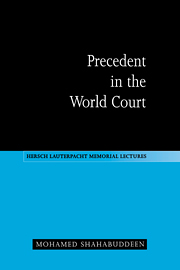Book contents
- Frontmatter
- Contents
- Foreword
- Preface
- List of abbreviations
- 1 Introduction
- 2 The growth of the Court's case law
- 3 Range of precedential resources
- 4 The bases of the system
- 5 The Advisory Committee of Jurists
- 6 The view taken by the League of Nations
- 7 The possibility of judge-made international law
- 8 Stare decisis
- 9 Distinguishing
- 10 Departing from a previous decision
- 11 Ratio decidendi and obiter dictum
- 12 Advisory opinions and decisions of chambers
- 13 The precedential impact of individual opinions
- 14 Effect and scope of the Court's case law
- 15 Conclusion
- Index
5 - The Advisory Committee of Jurists
Published online by Cambridge University Press: 04 May 2010
- Frontmatter
- Contents
- Foreword
- Preface
- List of abbreviations
- 1 Introduction
- 2 The growth of the Court's case law
- 3 Range of precedential resources
- 4 The bases of the system
- 5 The Advisory Committee of Jurists
- 6 The view taken by the League of Nations
- 7 The possibility of judge-made international law
- 8 Stare decisis
- 9 Distinguishing
- 10 Departing from a previous decision
- 11 Ratio decidendi and obiter dictum
- 12 Advisory opinions and decisions of chambers
- 13 The precedential impact of individual opinions
- 14 Effect and scope of the Court's case law
- 15 Conclusion
- Index
Summary
Ambivalence in the work of the Committee
As was observed by Hersch Lauterpacht, ‘the necessity of providing for a tribunal developing international law by its own decisions had been the starting-point for the attempts to establish a truly permanent international court as distinguished from the Permanent Court of Arbitration’. Yet, the extent to which the founders of the Permanent Court of International Justice foresaw the development of the system of precedents might not have been altogether clear. As the same writer later observed:
Although the need for a tribunal ensuring, through its continuity, the development of international law was one of the main reasons for the creation of a permanent court of international justice, it is possible that the lawyers and statesmen who in 1920 drafted the Statute of the Court did not fully appreciate all the possibilities, in this direction, of the activity of the Court about to be established.
There seems, in particular, to have been some ambivalence in the work of the Advisory Committee of Jurists, by which the Statute of the Permanent Court of International Justice was drafted in 1920, in the sense that, while there were assertions, forceful enough, to the effect that judges only declared the law, the objective drift of some of the material was in the opposite direction.
- Type
- Chapter
- Information
- Precedent in the World Court , pp. 48 - 54Publisher: Cambridge University PressPrint publication year: 1996
- 1
- Cited by

